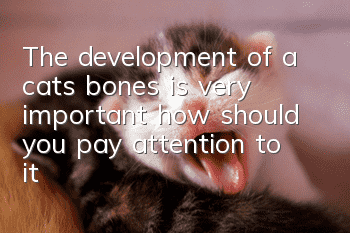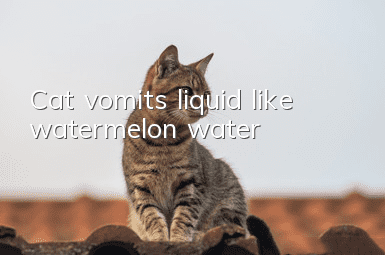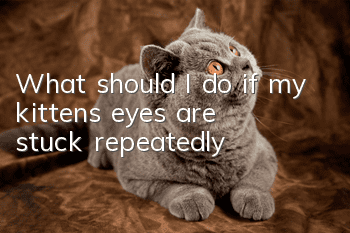The development of a cat’s bones is very important, how should you pay attention to it?

In the growth process of cats, the kitten period is the period of greatest change in all aspects, requiring a lot of energy to support the growth of cats. Meows love to jump, run and climb. At this time, they need good physical fitness to support them. Bone health is very important. Therefore, it is necessary to ensure that cats consume comprehensive and balanced nutrients. Next, let me talk about the bone health problems of cats in detail~
Cats under one year old are considered puppies. Before weaning, young cats need to obtain the resistance and immune substances needed for their growth and development from breast milk. When the cat is about two months old, the owners will begin to wean the little cat step by step. At this time, vitamin E supplementation becomes the focus of the diet.
At 15 weeks of age, growing kittens will have permanent teeth. At 8 months of age, the teeth are fully developed. In addition, the huge changes in body shape show that their bones are developing rapidly, so the reasonable intake of calcium and phosphorus is more important. is important. Calcium and phosphorus play important roles in your cat's bone health.
Calcium Ca & Phosphorus P
More than 90% of the calcium and more than 80% of the phosphorus in the cat's body work together to maintain the strong bone and tooth structure. Calcium deficiency can affect the growth and development of kittens, while phosphorus deficiency can lead to slow growth, loss of appetite and bone deformities. Calcium is found in the bones of mammals, birds, and fish and is often added to pet foods in the form of bone meal. Dairy products also contain high amounts of calcium; vegetables, such as broccoli and cabbage; and common mineral salts include calcium carbonate, calcium sulfate, and calcium sulfate.
In addition to the well-known calcium and phosphorus, there are two other elements that also have an impact on cat bones.
Vitamin D
Vitamin D is essential for regulating calcium and phosphorus metabolism. Vitamin D can increase the intestinal absorption rate of calcium and phosphorus, promote calcium absorption by bones, and reduce the loss of calcium and phosphorus in urination. Vitamin D deficiency may lead to rickets, weight loss, osteomalacia, and more. Excessive vitamin D intake may cause canine bone metabolism to slow down and bone stiffness.
In cats, excess vitamin D may cause mineral accumulation in the skin, hypercalcemia, depression, vomiting, and lethargy. Symptoms are most pronounced in kittens and puppies, where skeletal abnormalities and soft tissue calcification may occur. Therefore, the control of quantity and quantity is a key factor.
Magnesium Mg
Magnesium plays a role in energy metabolism, DNA and RNA metabolism, protein synthesis, and the proper functioning of muscle and nerve cell membranes. At the same time, like calcium and phosphorus, magnesium is also an important component of bones and teeth. A deficiency in magnesium can lead to neurological problems such as joint hyperextension, paralysis, high blood pressure, and decreased appetite. For cats, dayExcess magnesium in the diet has been linked to the formation of struvite, a type of kidney stone.
The bone growth of cats is as important as that of young children. They often jump around and need comprehensive nutrition to grow healthily. For the sake of your cat’s health and the prevention of future illnesses and injuries, take the time to improve their diet system now.
- Cat is in good spirits but doesn’t like to eat
- A cat purrs. What does it mean when a cat purrs?
- How to choose a cat sedative! Everything you need to know about cat sedation!
- What should I do if my cat keeps running out when I open the door?
- What are the personality traits of tabby Siamese cats?
- How to teach a cat to use the litter box? Train a cat to use the litter box to go to the toilet!
- What should you do if your Ragdoll cat doesn’t eat cat food? I’ll teach you a few ways to do it easily!
- Why do cats like to eat geckos?
- It usually takes a few months to raise a cat
- Spring is here, what should I do when my cat changes hair?



